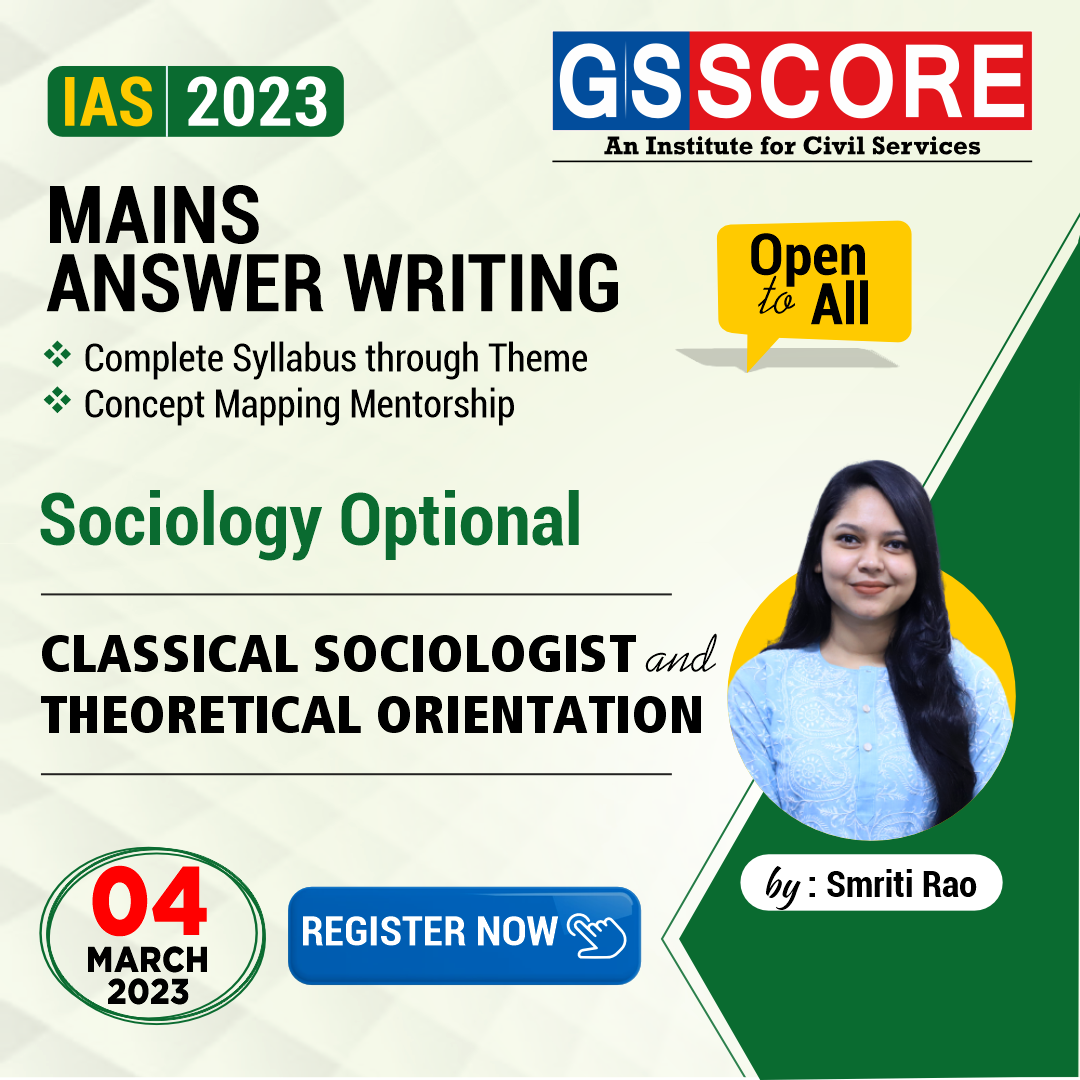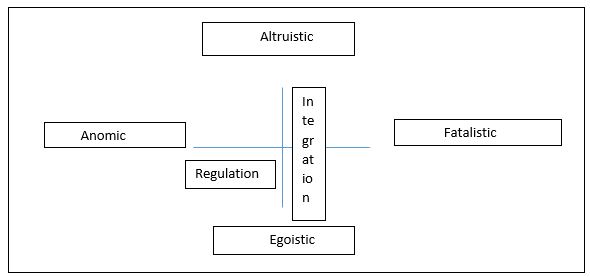


Instruction:
- There will be 2 questions carrying 10 marks each. Write your answers in 150 words
- Any page left blank in the answer-book must be crossed out clearly.
- Evaluated Copy will be re-uploaded on the same thread after 2 days of uploading the copy.
- Discussion of the question and one to one answer improvement session of evaluated copies will be conducted through Google Meet with concerned faculty. You will be informed via mail or SMS for the discussion.
Question #1. Briefly examine Karl Marx’s statement, ‘Religion is the Opium of masses’
Question #2. Analyze high suicide rates of contemporary Indian society with Durkheim’s theory.
(Examiner will pay special attention to the candidate's grasp of his/her material, its relevance to the subject chosen, and to his/ her ability to think constructively and to present his/her ideas concisely, logically and effectively).
STEPS & INSTRUCTIONS for uploading the answers
Step 1 - The Question for the day is provided below these instructions. It will be available at 7:00 AM.
Step 2 - Uploading of Answers : Write the answer in A4 Sheet leaving proper margins for comments and feedback and upload the PDF in MY ACCOUNT section. Click on the option of SUBMIT COPY to upload the PDF.
Step 3 - Deadline for Uploading Answers: The students shall upload their answers by 7:00 PM in the evening same day. The first 50 copies will be evaluated.
Step 4 - Feedback : Mentors will give their feedback for the answers uploaded. For more personalised feedback, join our telegram channel by clicking on the link https://t.me/mains_answer_writing_cse . A one-to-one session will be conducted with the faculty after copy evaluation in 72 Hrs.
Model Answer
Question #1. Briefly examine Karl Marx’s statement, ‘Religion is the Opium of masses’
Ans.
Karl Marx opined that human societies are all based on a model of two components. Using economic determinism, he stated that there is an economic base which constitutes of mode of production, this drives the foundation for any society. The Superstructure can be understood as sharing a causal relationship with the economic base. According to Marx, religion is that institution which appears in the superstructure but is bound by the nature of the economic base. With specific reference to the Capitalist mode of production, religion is used as a salve that can temporary blind the exploitative character of the Bourgeoisie.
The Capitalist mode of production is unique in the sense that it is under this stage in the society that alienation reaches its peak. He deliberates that only is capitalism an unjust and inefficient mode of production, it is also marked by subversion of human nature. The increasing polarisation between haves and have not denies man his basic rights, true nature and subjects him to disassociation from the product, process of production and fellow workers. This pathological division of labour leads to alienation which is nothing but a feeling of disenchantment or disillusionment.
Marx states that religion is also a form of alienation where the individual gives up his own creative spirit and the ability to control his life in the belief of the supernatural being. According to Marx in such a situation, religion provides one with false consciousness of being united in devotion to the supernatural. With the term, ‘Opium of Masses’ he intends to state that this feeling of betterment keeps the group from noticing that they are being collectively deprived. The exploitation of the bourgeoisie by the proletariat is then hidden in plain sight, which religious orientation tries to conceal.
Furthermore, Marx colludes with Weberian analysis that Protestantism played an instrumental role in the emergence of Capitalism as it rendered to the commercial needs of the merchants of that time. With ideals such as hard work, calling, doctrine of predestination, the workers were made to conform to the profit accruing nature of capitalism which benefited the capitalists. Marx suggests that religion exists as a justification for the state and society collusion where there is an ideological tool that is used to suppress the masses by the wealthy elites.
In giving human beings the status of a creator, Marx laments, “Man makes religion, religion does not make man”, however as people forget that they have endowed man like qualities in God, they believe that the supernatural force has a life of its own and it controls man’s destiny. It is only in the hands of man, then to destroy, what he creates. Marx suggested that the secularization of the society will ultimately liberate people from the clutches of social oppression. Thus, in the ultimate stage of communism, religion will not continue to be an institution of much importance and its illusory effect will collapse.
Question #2. Analyze high suicide rates of contemporary Indian society with Durkheim’s theory.
Ans.
-Define suicide
-Epistemology
-Sociological elements in Durkheim’s study
-Contemporary examples
-Conclusion
Suicide according to Emile Durkheim is any case of death that is caused by direct or indirect, positive or negative action of the victim himself, who fully knows the consequences of such an act. Durkheim is a functionalist sociologist who believes that the social characteristics can help determine the cause and effect of various social actions.
Methodology
could insert a diagram here
Object of study: Suicide Rates
Methodological tool: Social Fact
Source of information: Secondary data analysis from Government statistics
School of thought: Functionalist
In his study on ‘Suicide’ Durkheim focussed on suicide rates, by analysing the level of integration with the society, religious orientation, marital status, occupational status, and gender of the persons that committed suicide.
Durkheim’s study can be used to understand contemporary suicide rates in India. According to the NCRB, the incidence and rate of suicide has increased by 0.2% during 2019 over 2018.
Types of suicide
Insert diagram of 4 quadrants
Could tabulate examples
Altruistic suicide Occurs when integration with social groups is too high. Suicides resulting from self immolation as an act of protest demanding favourable stance by the government. Student suicides during Telangana state struggle, Buddhist self immolation in Tibet and Arunachal are some examples.
Anomic Suicide
Farmer suicides in India rise out of low regulation of the government added by high levels of stress. High moral binding makes farmers attach the ability to return the borrowed money with personal honour and status in the society, failing which they become helpless and resort to suicide. A low level of regulation occurs where the government and concerned institutions fail to take measures to curb crop failures.
Egoistic Suicide Student suicides due to examination results, may be considered as egoistic suicides which occur when there is an absence of social integration. In this regards, parental supervision, academic expectations by schools, and society’s demands may together form social integration, which, when low, may result in egoistic suicides.
Fatalistic Suicide These suicides occur when there is high regulation of individuals. Celebrity and businessmen suicides resulting out of high expectations from the society or bankruptcy could be reflective of fatalistic suicide.
Furthermore, NCRB notes that family problems and illness were the prime most cause for suicides in the country, which reflects the level of integration in the contemporary Indian society. Various social factors may result in suicidogenic impulse in the society, however taking clue from Durkheim’s analysis, any examination of suicides in contemporary India must be made with the help of data and statistics.
Critique
Durkheim’s work on Suicide has been criticised for
- Doughlas challenges the simple definition of suicide and argues that suicide has different motives and meanings, specific to each individual.
- Gibbs and Martin pointed out at the insufficient examination of ‘integration’ and questioned how it could be measured.
- Maxwell Atkinson criticises Durkheim’s use of official statistics. He argues suicide is an interpretation of a situation and the police records cannot be falsified, therefore the data accumulation is not quite the scientific process Durkheim makes it out to be.
Therefore Durkheim has been critiqued on the account of methodological bias and theoretical insufficiency.
Nonetheless Durkheim’s work on Suicide remains to mark a watershed moment, at least in revealing that sociological analysis can determine the social reality in a distinct manner.
Sociology is distinguishable from commonsensical approach to society due to its scientific bent. Classical sociologists yearned to make the study of society concrete, verifiable, and applicable.
This section carries heavy weight in itself and also in terms of its application across the entirety of the syllabus.
In this theme we will analyze how to approach key thinkers and scrutinize their contribution to the subject matter of Sociology.
Approach :
1. Understanding signficance of sociological thinkers
2. Discerning nature of questions
3. Relevance of theory
4. Differentiating and overlapping paper 1 and 2
Topics under the theme
1. Trinitarian role models of Sociology: Durkheim, Marx, Weber
2. Analysis of Sociological perspectives: Functionalist, Conflict, Symbolic Interactionist
3. Classical Theories and their contemporary relevance




